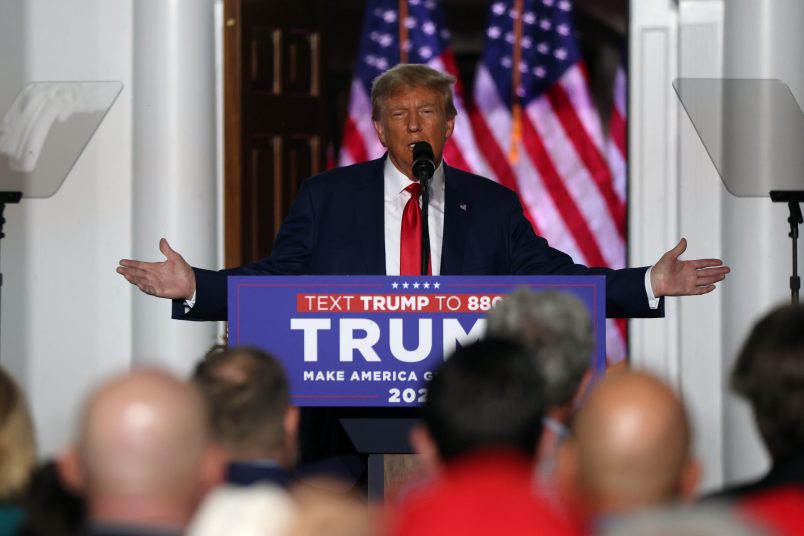Jack Goldsmith has an op-ed in today’s Times in which he argues that the prosecutions of Donald Trump are likely to have terrible consequences for the country, regardless of the bad acts he may have committed. The gist of his argument is straightforward: Prosecution will only further delegitimize the Department of Justice for a large segment of the population, further criminalize the political process and open the Pandora’s Box of Presidents prosecuting their predecessors. I struggled with this piece a bit because I think Goldsmith is a good faith interlocutor. But while the sentiment is genuine the reasoning is sloppy and derives most of its strength from simply ignoring the most obvious counterarguments.
This core weakness begins right in the first sentence.
Like many who write this kind of op-ed, Goldsmith starts by saying that while it might be emotionally “satisfying” to see Trump held to account for his misdeeds, the damage greatly outweighs whatever benefit it brings. This is a dodge that turns out to be more consequential than one vaguely condescending throwaway line. In a highly polarized political culture of course there will be people celebrating. But the reason such indictments are important, really critical, is that a republican government cannot exist if electoral losers routinely use fraud, state power and violence to reject the outcome of free and fair elections. Accepting electoral defeat and orderly transfers of power is the glue that allows a republican government to function.
To buttress his argument about polarizing and delegitimizing federal law enforcement, Goldsmith lists other recent purported DOJ errors or controversies including the Mueller investigation and the investigation of Hunter Biden. While it’s true that Republican perceptions of these cases have an importance in themselves, regardless of their validity, Goldsmith runs right past this observation and seems to at least half agree that the Mueller probe was a mistake and that Hunter Biden got a sweetheart deal from the Trump appointee who oversaw his investigation. Indeed he seems open to the Republican claim that the whole Smith investigation itself is just political payback. It’s a cocksure and breezily indifferent tone he returns to when he pooh-poohs the whole coup plot as “election shenanigans.”
But this sloppy reasoning is almost beside the point. Of course it’s damaging for the Department of Justice of one President to bring criminal charges against his predecessor or would-be successor. To observe that is to do no more than state the obvious. But such warnings only have any meaning judged in a fuller context. To grant de facto immunity for numerous instance of egregious criminal conduct, especially criminal conduct that strikes at the core function of the state itself, is vastly more damaging. Goldsmith must realize this at some level and that’s why he gives the whole question barely more than a sentence-long hand wave about Smith’s possible motives for bringing the indictments. It’s an omission annd evasion that goes right back to that opening line when he dismisses the value of prosecution as little more than a brief sugar high Trump critics enjoy watching a reckoning for an inveterate rogue.
During the Civil War, one of the core themes of Abraham Lincoln’s speeches and writing was whether and how republics, popular governments, could defend and protect themselves. Are they strong enough to do so? Does the procedural nature that gives them civic value, the various checks and balances, render them too weak to sustain themselves against determined foes? Today we are faced with a comparable question. Can it really be the case that a former president who attempted a coup to remain in office is immune because he is a former president? Or because he runs for the office again? Or because he attacks the legitimacy of the prosecution? Surely each attribute or action is all but prepackaged into the profile of a man who would have attempted a coup in the first place. Stating the matter so plainly illustrates the absurdity of it.
The most straightforward argument for charging Trump with attempting to overturn the result of the 2020 election is that he did it. The facts justify the charge. But as Goldsmith rightly argues, for such a novel and consequential case that can’t be the end of the conversation. There’s also a prudential calculation. The most obvious rationale is deterrent. The republic can’t survive if candidates can freely attempt to reverse defeats with impunity.
Critics like Goldsmith routinely argue that we should seek remedies for political bad acts at the ballot box rather than in the courtroom. In many contexts this is a powerful argument. But they ignore the rather elementary fact that if the results of elections can be ignored or reversed by corrupt means the argument falls apart.
It’s true that some of Trump’s supporters will be deepened in their suspicions of the Department of Justice. But it is equally true that those who consider the results of elections sacrosanct and act accordingly will be demoralized by his impunity.
Above I argued that the quite real damage or stresses to the system caused by Trump’s prosecution are vastly outweighed by the cost of granting him immunity. Certainly someone with Goldsmith’s intellect could construct a contrary argument about which of the dangers is greater. But in this essay he doesn’t try. He doesn’t engage the question. He simply writes it off with a pat argument about the criminalization of political differences.






